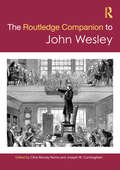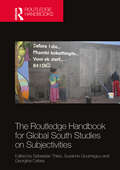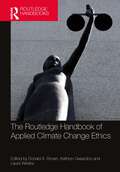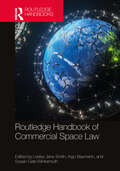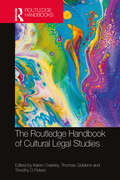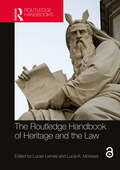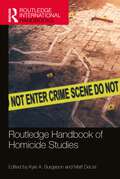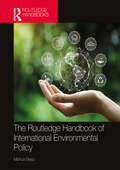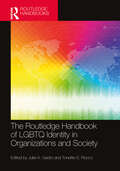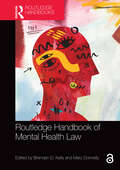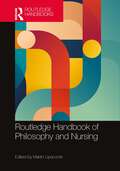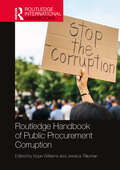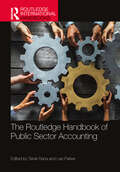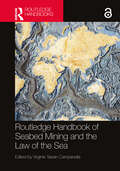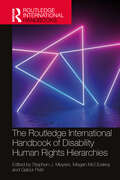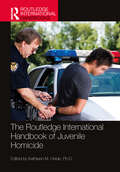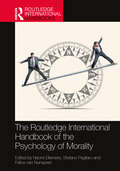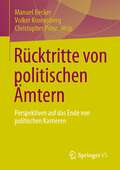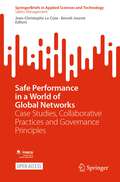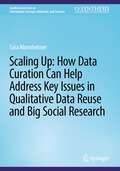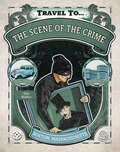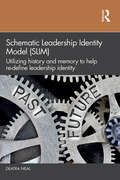- Table View
- List View
The Routledge Companion to John Wesley (Routledge Religion Companions)
by Clive Norris Joseph CunninghamThe Routledge Companion to John Wesley provides an overview of the work and ideas of one of the principal founders of Methodism, John Wesley (1703-91). Wesley remains highly influential, especially within the worldwide Methodist movement of some eighty million people. As a preacher and religious reformer his efforts led to the rise of a global Protestant movement, but the wide-ranging topics addressed in his writings also suggest a mind steeped in the intellectual developments of the North Atlantic, early modern world. His numerous publications cover not only theology but ethics, history, aesthetics, politics, human rights, health and wellbeing, cosmology and ecology. This volume places Wesley within his eighteenth-century context, analyzes his contribution to thought across his multiple interests, and assesses his continuing relevance today. It contains essays by an international team of scholars, drawn from within the Methodist tradition and beyond. This is a valuable reference particularly for scholars of Methodist Studies, theology, church history and religious history.
The Routledge Handbook for Global South Studies on Subjectivities (Transdisciplinary Souths)
by Sebastian Thies Susanne Goumegou Georgina CebeyThe Routledge Handbook for Global South Studies on Subjectivities provides a series of exemplary studies conjoining perspectives from Asian, African, and Latin American Studies on subjectivity in the Global South as a central category of social and cultural analysis. The contestation of the Northern myth of the autonomous subject—the dispositive that contests subject formation in the South by describing it as fragmented, incomplete, delayed or simply deviant, has been a cornerstone of theory production from the South over the years.This volume’s contributions offer an interdisciplinary and transarea dialogue, reframing issues of selfhood and alterity, of personhood, of the human, of the commons and contesting the North’s presumption in determining what kind of subjectivities abide by its norms, whose voices are heard, who is recognised as a subject, and, by extension, whose lives matter. In the context of the shifting dynamics of today’s manifold crises, they raise questions regarding how subjectivities act on or resist such forms of contestation, contingency, and indeterminacy.A major contribution to the growing body of scholarship on the Global South, this handbook will be an essential resource for students, scholars, researchers and instructors in literature, media and culture studies, sociology, anthropology, philosophy, law, politics, visual arts and art history.
The Routledge Handbook of Applied Climate Change Ethics (Routledge Handbooks in Applied Ethics)
by Donald A. Brown Kathryn Gwiazdon Laura WestraThe Routledge Handbook of Applied Climate Change Ethics is a powerful reference source for the identification and exploration of the underlying ethical issues in climate change law and policy. Bridging theory with practice, it takes ethical engagement out of the classroom and into the halls of governance. The Handbook‘s 39 chapters--written by a diverse and inter-disciplinary team of experts from around the world--are case studies divided into five parts. Parts I-IV highlight the ethical issues that arise in climate change policy formation, from duties not to harm to duties to consider the views and voices of those who will be, or are being, harmed; from the role of human rights, justice, and democracy to how to identify and respond to disinformation and denialism. It also raises the ethics of various policy responses, such as cap-and-trade, carbon taxing, and geo-engineering. Part V offers a way forward, with strategies on how to expressly consider ethics in climate change policy formation, from negotiations to education, media, communication, and the power and potential of shaming. The volume is essential reading for students, professors, and practitioners who wish to better engage with government and non-government organizations on climate policy, to better understand the practical application of the theory and philosophy of ethics, and how to more strongly draft and defend ethical action in negotiating, drafting, and defending climate change law and policy.
Routledge Handbook of Commercial Space Law (Routledge Handbooks in Law)
by Lesley Jane Smith, Ingo Baumann, and Susan-Gale WintermuthThe Routledge Handbook of Commercial Space Law provides a definitive survey of the transitions and adjustments across the stakeholder community contributing to outer space activities. The interaction between NewSpace, traditional aerospace industrials, and non-traditional space-related technologies is driving market changes which will affect state practice in what has until now been a government dominated market. Greater private commercial participation will lead to new economic approaches to risk-sharing models driven by a space services dominated market. This handbook is a detailed reference source of original articles which analyse and critically evaluate the scope of the current paradigm change, and explain why space contracts and risk apportionment as currently known will change in tune with ongoing market transitions. Reference is made to the scope of best practices across various leading states involved in space activities. With contributions from a selection of highly regarded and leading scholars and practitioners in the Commercial Space Law field, and the inclusion of salient documents, regulatory and contractual documents, the Routledge Handbook of Commercial Space Law is an essential resource for students, scholars, and practitioners who are interested in the field of Commercial Space Law.
The Routledge Handbook of Cultural Legal Studies
by Karen Crawley Thomas Giddens Timothy D PetersThis handbook provides a comprehensive introduction to the cutting-edge field of cultural legal studies.Cultural legal studies is at the forefront of the legal discipline, questioning not only doctrine or social context, but how the concerns of legality are distributed and encountered through a range of material forms. Growing out of the interdisciplinary turn in critical legal studies and jurisprudence that took place in the latter quarter of the 20th century, cultural legal studies exists at the intersection of a range of traditional disciplinary areas: legal studies, cultural studies, literary studies, jurisprudence, media studies, critical theory, history, and philosophy. It is an area of study that is characterised by an expanded or open-ended conception of what ‘counts’ as a legal source, and that is concerned with questions of authority, legitimacy, and interpretation across a wide range of cultural artefacts. Including a mixture of established and new authors in the area, this handbook brings together a complex set of perspectives that are representative of the current field, but which also address its methods, assumptions, limitations, and possible futures.Establishing the significance of the cultural for understanding law, as well as its importance as a potential site for justice, community, and sociality in the world today, this handbook is a key reference point both for those working in the cultural legal context – in legal theory, law and literature, law and film/television, law and aesthetics, cultural studies, and the humanities generally – as well as others interested in the interactions between authority, culture, and meaning.
The Routledge Handbook of Heritage and the Law (Routledge Handbooks on Museums, Galleries and Heritage)
by Lucas Lixinski Lucie K. MorissetThe Routledge Handbook of Heritage and the Law sheds light on the relationship between the two fields and analyses how the law shapes heritage and heritage practice in both expected and unexpected ways.Including contributions from 41 authors working across a range of jurisdictions, the volume analyses the law as a transnational phenomenon and uses international and comparative legal methodologies to distil lessons for broad application. Demonstrating that the law is fundamentally a language of power and contestation, the Handbook shows how this impacts our views of heritage. It also shows that, to understand the ways in which the law impacts key aspects of heritage practice, it is important to tap into the possibilities of heritage as points of convergence of identity, struggles over resources, and the distribution of power. Framing heritage as a driver for legal engagement rather than a passive regulatory object, the book first reviews the legal fields or mechanisms that can shape action in the heritage field, then questions how these enable authority and give power to those who seize heritage, and finally envisions how the discussion between heritage and the law can lay new grounds in both those fields. Lifting the mists that often render the law opaque in heritage studies, the Handbook showcases the law as a medium through which the culture and the power of heritage are expressed and might be shared.The Routledge Handbook of Heritage and the Law presents a view of the law that is aimed at those who wish to reflect on how law has changed, or could change, what heritage is and how it can support social, cultural, local, or other development. It will be of interest to scholars, students, policymakers, and practitioners working in the areas of museum studies, heritage studies, and urban studies, as well as in cultural intervention and planning.
Routledge Handbook of Homicide Studies (Routledge International Handbooks)
by Kyle A. Burgason Matt DeLisiThe Routledge Handbook of Homicide Studies comprehensively examines the topic of homicide from a diverse collection of perspectives and backgrounds. It brings together original contributions on homicide, with a focus on the broad range of impacts of homicide from a multitude of disciplines that evaluate and examine homicide in actual practice and theory. The editors have assembled a comprehensive collection highlighting the multifaceted causes and ramifications of homicide both across the United States and globally, with chapters exploring the current state of homicide, typologies of homicides offenders, causes and correlates of homicide, homicides and the criminal justice system, and a professional observations chapters authored by some of the leading practicing professionals in the world, many of whom have made pivotal contributions to the evaluation and investigation of homicide offenders and cases. Providing state-of-the-art scholarship on homicide in modern society, this handbook is a key collection and an invaluable resource for students, researchers, and practitioners engaged in the study of homicide across a diverse range of disciplines, including criminal justice and criminology, psychology, sociology, forensics, interdisciplinary departments, and sociolegal studies.
Routledge Handbook of Homicide Studies (Routledge International Handbooks)
by Kyle A. Burgason Matt DeLisiThe Routledge Handbook of Homicide Studies comprehensively examines the topic of homicide from a diverse collection of perspectives and backgrounds. It brings together original contributions on homicide, with a focus on the broad range of impacts of homicide from a multitude of disciplines that evaluate and examine homicide in actual practice and theory. The editors have assembled a comprehensive collection highlighting the multifaceted causes and ramifications of homicide both across the United States and globally, with chapters exploring the current state of homicide, typologies of homicides offenders, causes and correlates of homicide, homicides and the criminal justice system, and a professional observations chapters authored by some of the leading practicing professionals in the world, many of whom have made pivotal contributions to the evaluation and investigation of homicide offenders and cases. Providing state-of-the-art scholarship on homicide in modern society, this handbook is a key collection and an invaluable resource for students, researchers, and practitioners engaged in the study of homicide across a diverse range of disciplines, including criminal justice and criminology, psychology, sociology, forensics, interdisciplinary departments, and sociolegal studies.
The Routledge Handbook of International Environmental Policy
by Mahua BasuThis handbook is a one-stop, comprehensive guide to global initiatives for climate action. It examines policies to tackle climate change and the critical role various organizations play.The volume: Includes in-depth discussion of individual issues related to the environment Highlights global initiatives, negotiations, and international organizations responsible for climate action, protecting marine and freshwater environment, protecting atmosphere and climate, conserving biological diversity, chemicals and wastes management, environmental governance, safeguarding against warfare and disasters Debates on-ground implications of the international policies for the Global South Brings together case studies from across the world Presents a toolkit for environment practitioners to seek sustainable and practicable solutions to problems Includes suggested readings for researchers Brings together primary documents, supportive illustrations, graphs, and maps The handbook will be an essential reference for scholars and researchers of environmental studies, environmental policy and governance, sustainability and resilience. It will also be indispensable for policy makers, think tanks and NGOs.
The Routledge Handbook of LGBTQ Identity in Organizations and Society (Routledge International Handbooks)
by Tonette S. Rocco Julie A. GedroSexuality, gender, gender identity, and gender expression are fluid constructs, and the ways in which identity development intersects with organizations and exists in society are complex. The book is comprised of a range of multi-disciplinary and globally inspired perspectives representing leading-edge scholarship by authors from over a dozen countries on a range of issues and contexts regarding LGBTQ identity and experience. It is intended for a wide readership: those who are in LGBTQ-related academic fields; those who want to broaden their coursework by offering supplemental readings that center the perspectives of LGBTQ identities; and those who want to acquire knowledge and education on the subject of LGBTQ identity. There are 36 chapters written by scholars in fields such as social work, law, queer studies, business, human resource management and development, entrepreneurship, criminal justice, economics, marketing, religion, architecture, sport, theater, psychology, human ecology, and adult education. The chapters can be read in sequence, and the book can also be used as a reference work for which educators, practitioners, and non-academics can identify and select particular chapters that inform areas of inquiry.
Routledge Handbook of Mental Health Law (Routledge Handbooks in Law)
by Brendan D. Kelly and Mary DonnellyMental health law is a rapidly evolving area of practice and research, with growing global dimensions. This work reflects the increasing importance of this field, critically discussing key issues of controversy and debate, and providing up-to-date analysis of cutting-edge developments in Africa, Asia, Europe, the Americas, and Australia. This is a timely moment for this book to appear. The United Nations’ Convention on the Rights of Persons with Disabilities (2006) sought to transform the landscape in which mental health law is developed and implemented. This Convention, along with other developments, has, to varying degrees, informed sweeping legislative reforms in many countries around the world. These and other developments are discussed here. Contributors come from a wide range of countries and a variety of academic backgrounds including ethics, law, philosophy, psychiatry, and psychology. Some contributions are also informed by lived experience, whether in person or as family members. The result is a rich, polyphonic, and sometimes discordant account of what mental health law is and what it might be. The Handbook is aimed at mental health scholars and practitioners as well as students of law, human rights, disability studies, and psychiatry, and campaigners and law- and policy-makers.
Routledge Handbook of Mental Health Law (Routledge Handbooks in Law)
by Brendan D. Kelly and Mary DonnellyMental health law is a rapidly evolving area of practice and research, with growing global dimensions. This work reflects the increasing importance of this field, critically discussing key issues of controversy and debate, and providing up-to-date analysis of cutting-edge developments in Africa, Asia, Europe, the Americas, and Australia.This is a timely moment for this book to appear. The United Nations’ Convention on the Rights of Persons with Disabilities (2006) sought to transform the landscape in which mental health law is developed and implemented. This Convention, along with other developments, has, to varying degrees, informed sweeping legislative reforms in many countries around the world. These and other developments are discussed here. Contributors come from a wide range of countries and a variety of academic backgrounds including ethics, law, philosophy, psychiatry, and psychology. Some contributions are also informed by lived experience, whether in person or as family members. The result is a rich, polyphonic, and sometimes discordant account of what mental health law is and what it might be.The Handbook is aimed at mental health scholars and practitioners as well as students of law, human rights, disability studies, and psychiatry, and campaigners and law- and policy-makers.
Routledge Handbook of Philosophy and Nursing
by Martin LipscombPhilosophy offers a means of unpacking and grappling with important questions and issues relevant to nursing practice, research, scholarship, and education. By engaging in these discussions, this Handbook provides a gateway to new understandings of nursing. The Handbook, which is split loosely into seven sections, begins with a foundational chapter exploring philosophy’s relationship to and with nursing and nursing theory. Subsequent sections thereafter examine a wide range of philosophic issues relevant to nursing knowledge and activity. Philosophy and nursing, philosophy and science, nursing theory. Nursing’s ethical dimension is described. Philosophic questions concerning patient care are investigated. Socio-contextual and political concerns relevant to nursing are unpacked. Contributors tackle difficult questions confronting nursing. Difficulties around speech, courage, and race/otherness are discussed. Philosophic questions pertaining to scholarship, research, and technology are addressed. International in scope, this volume provides a vital reference for all those interested in thinking about nursing, whether students, practitioners, researchers, or educators.
Routledge Handbook of Public Procurement Corruption (Routledge International Handbooks)
by Sope Williams Jessica TillipmanThe Routledge Handbook of Public Procurement Corruption showcases the most innovative and exciting research being conducted in this important area of study, providing a comprehensive go-to reference for all who are interested in the topic.During the COVID-19 pandemic, the global race for health and ancillary goods amid global supply chain disruptions demonstrated that, when tested, all countries are incredibly vulnerable to fraud and corruption in public procurement, irrespective of their level of development. Yet despite the widespread nature of the problem, there remains a lack of in-depth, analytical, and cross-country investigations into public procurement corruption. This book addresses this gap by providing a comprehensive, multidisciplinary, geographically balanced treatise on corruption in public procurement. It combines country-specific studies to allow readers to easily compare differing perspectives and approaches and overarching thematic chapters to reflect on new and cutting-edge issues in procurement and their implications for procurement corruption. Key sectors such as healthcare and infrastructure are considered, as well as the role of new technologies, in both combatting and enabling procurement corruption.This Handbook provides academics, practitioners, and graduate researchers of public administration, law, and anti-corruption with all of the tools they need to understand the nuances of public procurement corruption around the world.
The Routledge Handbook of Public Sector Accounting (Routledge International Handbooks)
by Tarek Rana Lee ParkerThe Routledge Handbook of Public Sector Accounting explores new developments and transformations in auditing, management control, performance measurement, risk management and sustainability work in the contemporary world of the public sector and the functioning of accounting and management in that realm. It focuses on critical analysis and reflection with respect to changing risk and crisis management patterns in the public sector in the current Covid- 19 and post- Covid- 19 era, across diverse social, political and institutional settings globally. This research-based edited book, targeted at scholars, professionals, teachers and consultants inthe fields of public sector accounting, auditing, accountability and management, offers high-level insights into the new architecture and execution of such activities in the emerging post-pandemic world. The chapters are written by leading scholars in the accounting and public administration disciplines internationally and provide important assessments, frameworks and recommendations concerning a wide variety of institutions, practices and policies with a view to addressing the many emerging societal, governmental and professional issues. Spanning theoretical, empirical and policy discussion contributions, the book’s chapters will be readily accessible to accounting, auditing and management audiences alike.
Routledge Handbook of Seabed Mining and the Law of the Sea (Routledge Handbooks In Law Ser.)
by Virginie Tassin CampanellaFor years, exploration of seabed natural resources has been ongoing while exploitation in deep marine areas remained unrealistic due to land-based mineral availability and costs. However, mounting pressures from the green transition, climate change, and long-lasting fears of terrestrial minerals scarcity now bring exploitation prospects closer to reality. This has caused concern to a growing chorus of States, scientists, industries, NGOs, and parts of civil society due to the potential environmental and social impacts of these activities. As a result, the idea of a moratorium or ‘precautionary pause’ is gaining ground. Yet, an important number of interpretation and implementation issues of the United Nations Convention on the Law of the Sea (UNCLOS) and the 1994 Agreement remain to be answered as a means to move forward in accordance with international law. This multidisciplinary book, designed to become the essential handbook on the matter, provides a global overview of the national, regional, and international regulatory frameworks applicable to the exploration and exploitation of seabed minerals on the continental shelf and the Area, as well as the related state of the science on the matter. By presenting historical and geopolitical context crucial to understanding regulation evolution, the book equips readers with foundational legal and policy knowledge. It furthermore addresses contemporary and prospective issues and offers unique insights into regional and national practices, including non-Party States to UNCLOS. Chapter VI.1.4 of this book is freely available as a downloadable Open Access PDF at http://www.taylorfrancis.com under a Creative Commons [Attribution-Non Commercial-No Derivatives (CC-BY-NC-ND)] 4.0 license.
Routledge Handbook of Seabed Mining and the Law of the Sea (Routledge Handbooks in Law)
by Virginie Tassin CampanellaFor years, exploration of seabed natural resources has been ongoing while exploitation in deep marine areas remained unrealistic due to land-based mineral availability and costs. However, mounting pressures from the green transition, climate change, and long-lasting fears of terrestrial minerals scarcity now bring exploitation prospects closer to reality.This has caused concern to a growing chorus of States, scientists, industries, NGOs, and parts of civil society due to the potential environmental and social impacts of these activities. As a result, the idea of a moratorium or ‘precautionary pause’ is gaining ground. Yet, an important number of interpretation and implementation issues of the United Nations Convention on the Law of the Sea (UNCLOS) and the 1994 Agreement remain to be answered as a means to move forward in accordance with international law.This multidisciplinary book, designed to become the essential handbook on the matter, provides a global overview of the national, regional, and international regulatory frameworks applicable to the exploration and exploitation of seabed minerals on the continental shelf and the Area, as well as the related state of the science on the matter.By presenting historical and geopolitical context crucial to understanding regulation evolution, the book equips readers with foundational legal and policy knowledge. It furthermore addresses contemporary and prospective issues and offers unique insights into regional and national practices, including non-Party States to UNCLOS.Chapter VI.1.4 of this book is freely available as a downloadable Open Access PDF at http://www.taylorfrancis.com under a Creative Commons [Attribution-Non Commercial-No Derivatives (CC-BY-NC-ND)] 4.0 license.
The Routledge International Handbook of Disability Human Rights Hierarchies (Routledge International Handbooks)
by Stephen J. Meyers Megan McCloskey Gabor PetriDisability is defined by hierarchy. Regardless of culture or context, persons with disabilities are almost always pushed to the bottom of the social hierarchy. With the advent of the Convention on the Rights of Persons with Disabilities (2006), disability human rights seemingly provided a path forward for tearing down ableist social hierarchies and ensuring that all persons with disabilities everywhere were treated equally. Despite important progress, the disability human rights project not only remains incomplete, but has often created new hierarchies among persons with disabilities themselves or across the human rights it promotes. Certain groups of persons with disabilities have gained new voices while others remain silenced and certain rights are prioritized over others depending on what states, international organizations, or advocates want rather than what those on the ground need most. This volume was inspired both by the continued need to expose human rights violations against persons with disabilities, but to also explore the nuanced role that hierarchies play in the spread, implementation, and protection of disability human rights. The enjoyment of human rights is not equal nor is the recognition of specific individuals and groups’ rights. In order to change this situation, inequalities across the disability human rights movement must be explored. Divided into five parts: Who counts as disabled? Political, social, and cultural context Which rights on top, whose rights on bottom? Pushed to the periphery in the disability rights movement Representations of disability and comprised of 34 newly-written chapters including case-studies from the Anglophone Caribbean, Bangladesh, Bosnia-Herzegovina, China, Ghana, Haiti, Hungary, India, Israel, Kenya, Latin America, Poland, Russia, Scotland, Serbia and South Africa, and other countries, this book will be of interest to all scholars and students of disability studies, sociology, human rights law and social policy.
The Routledge International Handbook of Juvenile Homicide (Routledge International Handbooks)
by Kathleen M. HeideThe Routledge International Handbook of Juvenile Homicide is the definitive work on juvenile homicide. This volume provides an up-to-date, comprehensive, and in-depth exploration of what is known about juveniles involved in murder. Taking an interdisciplinary approach to juvenile homicide, this handbook brings together the leading experts in social sciences, mental health, and law from many countries. The volume covers the phenomenon of juvenile homicide from beginning to end, by addressing the questions “why do kids kill?” all the way to “how does society stop them from killing?”. The tough issues involved in sentencing youths who take the lives of others, often deliberately and in horrific ways, are confronted through chapters addressing the legal issues, child development factors, risk assessment, public attitudes, and ethical concerns. The volume brings together research specifically conducted for this volume, in addition to summaries and discussions of clinical and empirical findings. Each chapter ends with key takeaway points. Contributors include psychologists, psychiatrists, criminologists, sociologists, lawyers, economists, biologists, epidemiologists, and public health and public policy experts. Uniquely, they examine murder by juveniles across the globe. The volume includes research pertaining to the causes, correlates, and theoretical explanations of juvenile homicide offending. Moving beyond discussions of juvenile homicide offenders (JHOs) as a homogenous group, the volume includes research on specific types of JHOs and research investigating age and gender differences among JHOs. In addition, it draws attention to the empirical factors associated with juvenile homicide offending, effective treatment of JHOs, recidivism, and prevention of violent behavior. The volume also makes recommendations for policy and practice, including how to shift government policy from punishing lawbreakers to saving lives. This volume is essential reading for scholars and students researching youth violence/juvenile homicide across a variety of disciplines including criminology, criminal justice, law, psychology, psychiatry, sociology, social work, public health, and education. It is also an invaluable reference for mental health professionals, practitioners in the juvenile and criminal justice systems, policymakers, and government leaders.
The Routledge International Handbook of the Psychology of Morality (Routledge International Handbooks)
by Naomi Ellemers Stefano Pagliaro Félice Van NunspeetThis cutting-edge handbook examines moral psychology and behavior, uncovering layers of human morality through a comprehensive overview of topics and approaches. Featuring an array of expert international contributors, the book addresses five key themes: moral reasoning, moral judgments, moral emotions, moral behavior and moral self-views. Each section includes empirical chapters that address these themes at the intrapersonal, interpersonal, intragroup or intergroup level. Each section starts with a reflective chapter from a leading scholar in this field of study who shares their personal vision on key issues and future developments. Drawing on emerging research and featuring real-world examples, the book offers a deeper understanding of the social psychological factors that shape our moral behavior and how this plays out in our daily lives. The Routledge International Handbook of the Psychology of Morality will be essential reading for academics and students in social psychology, the psychology of morality, business ethics and related areas. It will also be a compelling resource for legal and HR professionals, policy makers and anyone interested in understanding the complex and multi-faceted nature of human morality.
Rücktritte von politischen Ämtern: Perspektiven auf das Ende von politischen Karrieren
by Manuel Becker Volker Kronenberg Christopher PrinzPolitikwissenschaftliche und zeitgeschichtliche Untersuchungen zu den Karrieren deutscher Spitzenpolitiker*innen beschäftigten sich bislang vor allem mit deren Aufstieg und weniger mit dem Ende von politischen Laufbahnen. Aus welchen Gründen treten Politiker*innen aus dem Amt zurück? Was sind die Hintergründe, Motive und Konsequenzen einer solchen Entscheidung? Müssen Rücktritte zwingend Resultat eines Scheiterns sein oder kann es auch „erfolgreiche“ Rücktritte geben? In diesem Band werden theoretische Grundlagen der Rücktrittsforschung aus rechtlicher und politikwissenschaftlicher Perspektive erarbeitet, Rücktrittskulturen in unterschiedlichen Ländern vergleichend untersucht sowie verschiedene Fallbeispiele in ihren spezifischen Einzelfallbedingungen unter die Lupe genommen.
Safe Performance in a World of Global Networks: Case Studies, Collaborative Practices and Governance Principles (SpringerBriefs in Applied Sciences and Technology)
by Jean-Christophe Le Coze Benoît JournéThis open access book provides an analytical and critical outlook, by leading scholars, of the impact of various trends in the quality of collaboration and resulting safety outcomes that arise from the evolution of traditional integrated production within a single firm into a complex web of partnerships and supply chains. In the face of increasing fragmentation within industrial production and the associated rise in the complexity of inter-organizational communication and transaction, this book analyses causal factors such as cost pressures, globalization of demand, increasingly flexible resource allocation and work organization, changes in legal liability and the possibilities afforded by information technology. Various case studies focus on the effects of crossing boundaries between organizations, between different trades and professions and between countries, assessing the effect of variations in regulatory structures and national cultures. Furthermore, they illustrate the wide range of organizational forms to be found in high-hazard industries today and the impact, potential or real, of the variety of forms of partnership on safety and well-being at work. The contributors assess the effect of out-sourcing and of various forms of partnership and governance on safety at work and how they can be made to support the prevention of major accident hazards.
Scaling Up: How Data Curation Can Help Address Key Issues in Qualitative Data Reuse and Big Social Research (Synthesis Lectures on Information Concepts, Retrieval, and Services)
by Sara MannheimerThis book explores the connections between qualitative data reuse, big social research, and data curation. A review of existing literature identifies the key issues of context, data quality and trustworthiness, data comparability, informed consent, privacy and confidentiality, and intellectual property and data ownership. Through interviews of qualitative researchers, big social researchers, and data curators, the author further examines each key issue and produces new insights about how domain differences affect each community of practice’s viewpoints, different strategies that researchers and curators use to ensure responsible practice, and different perspectives on data curation. The book suggests that encouraging connections between qualitative researchers, big social researchers, and data curators can support responsible scaling up of social research, thus enhancing discoveries in social and behavioral science.
The Scene of the Crime, Grades 5 - 9 (Travel to...)
by Lisa KurkovA life of crime doesn't pay—and yet thousands of crimes are committed every day across the country. What crimes stand out in history and why? Learn about some of the most bizarre and famous American crimes and how their locations have become a part of the fabric of our country in Scene of the Crime, part of the Travel to… book series.Crime scenes are found all across America—from sites of unforgivable events to the locations of shocking criminal actions. In this nonfiction book, readers will learn about some of the most notable crime scenes in America, and explore how we define the idea of crime in a society.True Crime Book for Grades 5-9 Features:Before- and after-reading activitiesExtension activityMap showing where readers have traveled to in the bookAbout Rourke Educational Media:We proudly publish respectful and relevant nonfiction and fiction titles that represent our diverse readers, and are designed to support reading on a level that has no limits!
Schematic Leadership Identity Model (SLIM): Utilizing History and Memory to Help Re-define Leadership Identity
by Deatra L NealA workbook for leaders who desire to be more effective and deliberate in their leadership identity and for young leaders coming into their own, this book introduces a unique two-step process to understand and define your leadership identity. While some leadership frameworks operate under static concepts of what makes a good leader, the Schematic Leadership Identity Model (SLIM) offers new and seasoned leaders an opportunity to explore the anchoring of who they are and the ebbs and flows of their attitudes and behaviors through life’s changes and experiences. The SLIM framework has two main footings of its seven phases: revolution, which is the recognition of one’s identity journey, and the theoretical constructs that help frame the process and evolution, a series of assignments and journal entries that helps each leader acknowledge their current leadership identity, unravel habits and behaviors that may not align with their idealized self, and redefine their leadership identity based on their findings and whom they aspire to be. The evolutionary design is a system necessary to be revisited as a leader goes deeper into their memories and experiences. This framework helps unearth unconscious and implicit biases that can hinder a leader’s social and cultural capital. No matter the industry or discipline, SLIM offers leaders a self-guided process of discovery that can profoundly examine the root causes of behaviors and attitudes to create meaningful change within themselves that can produce significant positive changes in their teams and organizations.
